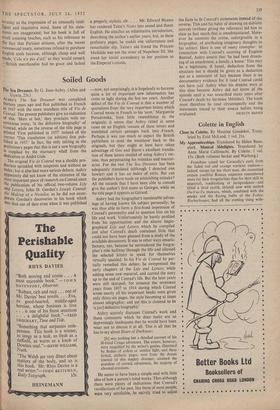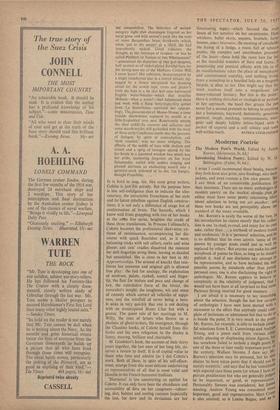Colette in English
Franchine raised her Caracalla's curls from the faded -fed and orange vorticist cushion— indeed, except for her short nose, she resembled certain youthful Roman emperors remembered more for their irregularities than for their skill in siegecraft, roadmaking or jurisprudence—and lifted a tired eyelid, striated now with melted Ou-Vas-Tu mascara, which, combined with the smoke and the flaying bulbs of the Folies- Rochechouart, had all the evening stung with- out compunction. The bitterness of second- category night club champagne lingered on her coral gums and wild animal's teeth like the taste of some Burgundian brass doorknobs which, when 'put in the corner' as a Child, she had impenitently sucked. Good riddance, she thought, as the footsteps of lacquot—or was he called Philibert or Tonton or just Whatsisname? —.announced the departure of that half-dauphin, half screwer-in of nickel-plated parallel-bars for the strong-man-act of the Medrano Circus. Will I never learn? Her reflection, Seurat-stippled by a single treacherous tear in a mirror already zig- zagged by a fissure unrcpaired but shouting aloud for the scotch tape, rivets and glazier's tools she kept in a tin that had once harboured English water-biscuits--which that irascible Melanie—what a name!—had fulminated there last week with a flung forty-franc-fifty goblet from La Samaritaine—surveyed her apprais- ingly. The. glaucous eye of Mouse-Mouse, a tame bedside shrewmousc captured by stealth at a little-frequented tarn near Romorontin among the shed caddis-fly cocoons and salicorns and some marsh-teazles still garlanded with the wool of those early Candlemas lambs that the peasants of Sologne, by spirit of contradiction, call 'slow coaches,' was no more obliging. The effluvia of the saddle of hare with shallots and fennel and a sprig of tarragon spared by the Ice-Saints in a japanned window box which was her pride, simmering forgotten on her loyal Salamander, curled with sudden longing and pleased alertness an enchanting nostril into a question-mark widowed of its dot. I'm hungry, thought Franchine. . . .
IT is hard to stop, for, like most great writers, Colette is jam for parody. But the purpose here is less self-indulgence than to indicate the idio- syncrasy, the intractable Frenchness of her style and its latent rebellion against English construc- tions; it is not only a difference of usage but of conformation of brain. The hazards, which I know well from grappling with two of her books in the sate fine series, heighten the credit of these three translations. In Princess Callimachi's, Colette becomes the professional short-term vir- tuoso of reminiscence, accompanying her dis- course with quick flourishes and, as it were, balancing tricks with salt cellars, corks and wine glasses and cats' cradles dissolved the moment her deft fingertips string them; leaving us dazzled but unsatisfied. She is close to her best in My Apprenticeships. The arsenal of knacks that rein- forces her immense and original gift is allowed free play : the feel for analogy, the exploitation of eardrum, palate, eyeball, nostril and finger- tip, the flair for texture and pace and change of key, the cumulative force of the trivial, the naturalist's insight, the toughness, wit and sense of comedy which correct all velleities of soppi- ness, and the windfall of never being a bore. It sinks in very quickly that one is not dealing with an emancipated Home Chat but with a genius. The queer tale of her marriage to M. Willy, the man of letters who throve on a phalanx of ghost-writers, the emergence, through the Claudine books, of Colette herself from this limbo and his own relegation to the shades is funny, moving, brilliant and charitable.
M. Goudeket's book, the account of their thirty years together, the last ones of her long life, de- serves a review to itself. It is of capital value to
those who love and admire (as I do) Colette's work. Both of them, in spite of his self-efface- ment, emerge from this most delicate undertaking as representatives of all that is most valid and likeable in the French humanist tradition.
'Humanist' is too constricting an epithet for Colette. It can only have been the abundance and
accessibility of data on her congeners—colour- ing, diet, habitat and mating customs (especially the last, for love and its deviations are her 'dominating topic)—which focused the main beam of her scrutiny on her co-primates. D whiskers, ballet skirts, sequins, brothels, fa houses, sauce béarnaise, the mowing of cornfield the laying of a hedge, a room full of toba smoke, the complex and unorthodox proce of the heart—these hold the same lure for b as the manifold wonders of flora and fauna. penetrating and poetical affinity with life in its manifestations takes the place of metaphyst and conventional morality, and nothing livin from a snowdrop to a bearded lady on a magen bicycle, is alien to her. One might say that h work resolves itself into a magnificent an many-volumed bestiary. But this is the point:, there is nothing detached or zoological or pytluan in her approach; the hand that grasps the Pa never for a second pretends to belong to anytht but a humorous, wayward, hedonistic, generous' poetical, tough, mocking, compassionate, ener• getic and deeply fallible fellow-biped with a packet of caporal and a stiff whisky and soda































 Previous page
Previous page